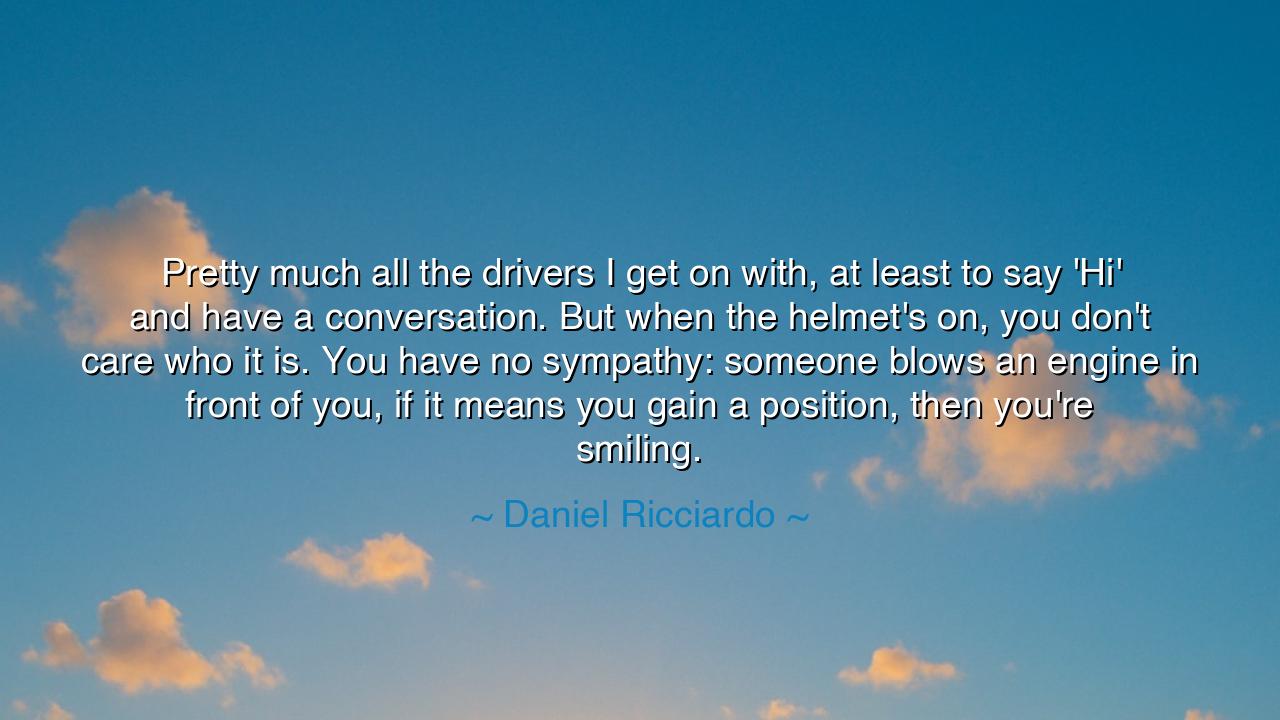
Pretty much all the drivers I get on with, at least to say 'Hi'
Pretty much all the drivers I get on with, at least to say 'Hi' and have a conversation. But when the helmet's on, you don't care who it is. You have no sympathy: someone blows an engine in front of you, if it means you gain a position, then you're smiling.






"Pretty much all the drivers I get on with, at least to say 'Hi' and have a conversation. But when the helmet's on, you don't care who it is. You have no sympathy: someone blows an engine in front of you, if it means you gain a position, then you're smiling." These words, spoken by Daniel Ricciardo, carry the weight of an essential truth about competition, focus, and human nature. In the heat of battle—whether on the racetrack or in life—there are moments when personal relationships and sympathies must be set aside for the sake of achieving one's goals. Ricciardo, a driver who has risen to the pinnacle of Formula 1 racing, speaks not just of the sport, but of a larger, universal principle: that in certain moments, the pursuit of success demands an unwavering commitment to one's own objectives, even at the expense of others.
At the heart of Ricciardo's quote lies the contradiction between camaraderie and competition. As humans, we are often driven by the desire for connection, for the warmth of friendship and the bonds we share with those around us. Ricciardo acknowledges this, noting that he gets along with his fellow drivers, exchanging pleasantries and maintaining relationships off the track. But once the helmet is on, signaling the start of the race, those personal connections are shunted aside. The track becomes a battlefield, and the pursuit of victory requires ruthlessness and focus. In that moment, each driver is not a friend or rival in the traditional sense, but a challenge to overcome. Sympathy takes a backseat to the singular goal: winning.
This duality—between personal bonds and the cold logic of competition—is not unique to the world of racing. Throughout history, great figures in warfare, sports, and business have had to navigate the delicate balance between humanity and ambition. Take, for example, Alexander the Great, whose military conquests were driven by a relentless desire for glory. Alexander often fought alongside his soldiers, but when it came time for battle, the bonds of friendship were set aside for the sake of conquest. His closest companions, including Hephaestion, stood beside him in the pursuit of their shared goals, but even in moments of victory or tragedy, the greater ambition of empire-building could not be compromised. Alexander’s victories were born from the understanding that success requires a focus beyond personal relationships, a commitment to the larger mission.
The lesson embedded in Ricciardo’s words lies in the understanding that, in moments of competition, we must sometimes detach ourselves from the emotional pull of sympathy and personal connection. This is not to say that we should abandon our humanity or disregard the feelings of others, but rather that we must recognize the moments when ruthless determination is required to achieve our goals. There are times when the pursuit of victory or success necessitates a laser focus on the task at hand, where we must place aside the desires for connection or emotional empathy and commit ourselves fully to the challenge before us.
History is filled with examples where great achievements were only made possible by the unflinching determination to succeed, even at the cost of personal bonds. Consider the story of Nelson Mandela, who, despite the immense personal suffering he endured, maintained his resolve to end apartheid in South Africa. While Mandela carried the deep weight of compassion for his people, his pursuit of justice required that he rise above personal resentment and work towards a larger vision of reconciliation and nation-building. His journey was one where personal sacrifice—his relationships, his time, his very freedom—became a necessary part of achieving a greater good. The ability to separate personal feelings from the larger mission was essential in his success.
Similarly, in the realm of business, Steve Jobs was known for his ruthless focus on innovation and success. His leadership style, at times, demanded that he prioritize the growth of Apple over personal connections. Jobs famously was demanding of his employees, placing immense pressure on them to meet the company’s lofty goals. While this approach could be perceived as cold or unfeeling, it was through this unwavering drive that Apple became one of the most successful companies in the world. In both cases, the individuals involved understood that the greater vision required a focus that sometimes left personal sympathies behind.
The practical takeaway from Ricciardo’s quote is the importance of recognizing when it is necessary to focus solely on the goal, setting aside distractions, including personal sympathies or emotional connections. It teaches us that success often comes to those who are willing to operate with clarity and determination when the stakes are highest. However, it also reminds us that these moments of ruthlessness must be tempered by wisdom. The balance between maintaining one’s humanity and pursuing ambition is a delicate one, and it is essential that we cultivate the ability to recognize when the situation demands one over the other.
In conclusion, Daniel Ricciardo’s words serve as a reflection of the competitive spirit that lies within all of us. The wisdom to be found in his words is in understanding the moments when detachment and single-mindedness are necessary to achieve greatness. Yet, it is equally important to remember that such focus should not dominate every aspect of life. We must find a way to bring humanity into our ambitions, even while knowing that there are times when sympathy must be set aside for the greater good. It is through this balance—between ruthless focus and compassionate engagement—that we can find our path to success.






AAdministratorAdministrator
Welcome, honored guests. Please leave a comment, we will respond soon